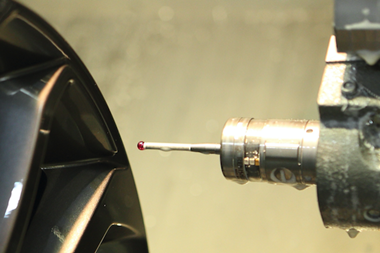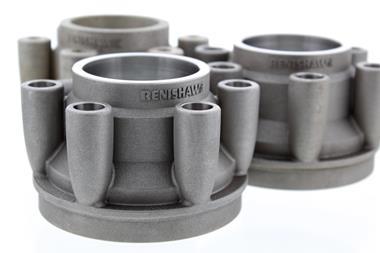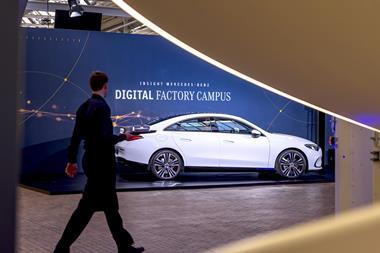Precision engineering and manufacturing technology specialist Renishaw is poised to support North American customers in tackling a new breed of production challenges
 Shorter product lifecycles and growing product mix require flexible machining and measurement solutions, which is why Renishaw’s technologies are increasingly being applied to support productive automotive manufacturing.
Shorter product lifecycles and growing product mix require flexible machining and measurement solutions, which is why Renishaw’s technologies are increasingly being applied to support productive automotive manufacturing.
Auto makers destined to win in this shifting environment will be those ready to champion the continued advancement of manufacturing technologies while also preparing for the advent of automobility.
Manufacturing industry’s adoption of probing has been firmly established since Renishaw brought the original touch-trigger probe to market in 1973. This step change in measurement accuracy brought about a revolution in three-dimensional co-ordinate metrology. Since then, Renishaw’s product range has grown to span the full spectrum of industrial metrology applications. Its technologies help machine shops throughout the automotive supply chain transform their production capabilities.
Today, Renishaw solutions also include position and motion control, and additive manufacturing, whose important functions enable the advancement of future vehicle design and manufacture.
Renishaw’s network of strategically located sites throughout North America ensures effective local support. The Michigan site is situated at the heart of traditional American automotive manufacturing in Detroit. The facility in Silicon Valley, California, meanwhile, services the emerging mobility community where the likes of Apple, Tesla and Uber are revolutionising the automotive environment. In response to the demands of its partners, Renishaw also has support operations in Chicago, USA; Ontario, Canada; and Monterrey, Mexico.
Controls that drive smart manufacturing
Rapid progress in AI, robotics and the ‘Industrial Internet of Things’ (IIoT) has triggered an explosion in the pace of technological breakthroughs for the industrial sector. The integration of physical manufacturing processes with digital information technologies provides manufacturers with an opportunity to develop smarter processes for improved capability and productivity.
Renishaw developed a structured, closed-loop approach to process control, using high levels of automation and connectivity to master the art of consistent, automated and productive metal cutting in its own production facilities. It now helps its partners to apply these technologies and integrate smart factory automation into their own production processes.
Manufacturers can identify and control sources of process variation before, during and after machining for optimum process capability and resource utilisation on the shop floor. Data relating to the condition of parts, the performance of machines, process trends, interventions and environmental effects reflect what’s happening at critical points in a manufacturing process. Data is analysed and adjustments are made before a bad part is produced, and all in the pursuit of zero waste, re-work and manual intervention.
Part inspection with multi-sensor capabilities
Renishaw’s industrial metrology technologies deliver the performance and data that global powertrain manufacturers require to solve a broadening array of challenges and produce engines that meet the demands of their users.
Renishaw’s REVO 5-axis CMM probing system with multi-sensor capabilities can rapidly scan parts to inspect form and surface finish on a single integrated platform. Increasing the work that can be done on one CMM removes the need for other dedicated equipment and frees up valuable shop floor space for improved financial payback. The addition of automatic surface finish measurement, also minimises the number of times a part is moved between platforms and the risk of damage to parts.
The REVO articulated probe head solves another familiar automotive challenge: it can perform rapid scanning for component inspection, but maintains high system accuracy without sacrificing speed. Inspection data is captured quickly (up to 500 mm per second) and communicated back into the manufacturing process for analysis. This short feedback loop gets process-critical data back to where it’s most useful – particularly valuable for inspecting features like valve seats and cylinder bores.
As the convergence of physical production processes and digital connectivity continues to transform the sector, Ohio CMM supplier Advanced Industrial Measurement Systems (AIMS) has been swift to adapt its products to the changing machine shop environment. AIMS recognised that demand for 100 per cent part inspection and the processing of inspection data within a smart factory environment gives the CMM a greater role to play. AIMS’s Revolution HB Shop floor CMM is fitted with Renishaw’s 5-axis PH20 touch-trigger indexing head and probe, for rapid collection of high-density points on a feature. The ability to monitor actionable data from a network of connected machines enables businesses to make real-time decisions and understand process capability at machine level.
Probing when a short cycle time is critical
As the name suggests, Renishaw’s latest SPRINT technology, part of its SupaScan system, offers the world’s fastest workpiece set-up cycles, which has transformed the viability of on-machine probing. Designed for integration into machine tool applications where reducing overall cycle time is critical, SPRINT technology is a game-changer for automotive. The SupaScan system can monitor surface condition (waviness), and its advanced scanning functionality enables users to monitor the final condition of component mating surfaces, such as cylinder head gasket faces. SupaScan is improving automotive productivity because multiple measurement types can be performed with a single sensor. On-machine contact scanning technology also means automatic health checks and process adjustments can be done on the shop floor. And because there’s no need to wait for maintenance personnel to perform tests, affected machines stop production for minutes, not hours.
Fast, flexible high-volume component gauging
Tremec Mexico, which specialises in transmission assemblies and components, discovered that it can save time and improve the efficiency of multi-device inspection processes using Renishaw’s Equator gauging system. Programmable in-line gauging, which keeps processes centred and delivers quality assurance close to the point of manufacture, is replacing hard gauging within the automotive sector.
Tremec integrated Equator gauges into its production process to reduce the shopfloor gauging time of Daimler parts by 85%. It provided a faster method of measuring parts with the flexibility to adapt to different project requirements. Tremec now performs gauging solely on the shop floor in two and a half minutes instead of one hour.
The foundation of quality is in the process
To survive in an evolving automotive landscape, manufacturers must partner with industry experts whose technologies are both innovative and proven. Renishaw’s track record in the automotive sector gives its partners confidence that they can successfully respond to changing requirements and outrun the competition. Indeed, Renishaw’s North American partners know that the foundations of quality and productivity lie in the control of processes, not products.
Design and test pioneering ideas with AM prototyping
Traditionally prototyping can be a high-cost phase of product development. Today, however, use of additive manufacturing (AM) can dramatically reduce prototype component development time and costs. For example, conformal cooling channels of almost unlimited complexity can be produced easily.
HiETA Technologies, worked with Renishaw to transfer production of its specialist range of heat exchangers from prototype manufacture to commercial production. HiETA used Renishaw AM systems to dramatically reduce manufacturing times and production costs for its heat exchangers.
Katcon Mexico used a Renishaw AM system to validate smaller, safer and more lightweight automotive prototypes. Katcon found that tooling that would take traditional suppliers four or five weeks to assemble could be developed in under a week in both plastic and metal. The important advantage was lower cost at higher speed. The company now uses AM in the production of a variety of automotive sub-assemblies, and aims to use additive technology to replace conventional component manufacturing.







































